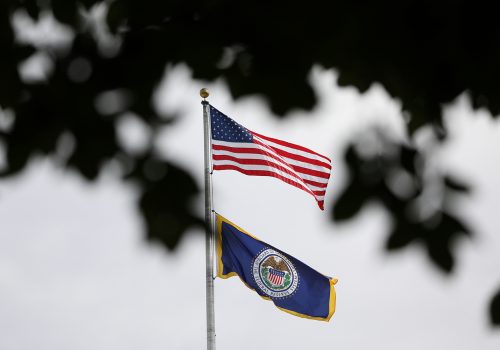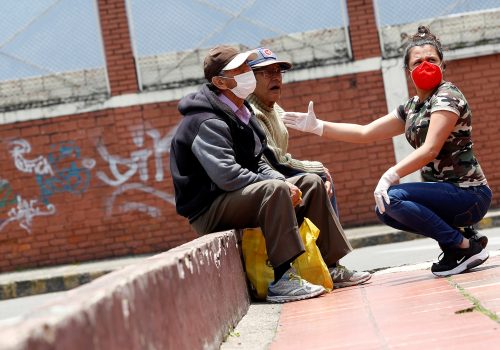CORONAVIRUS ALERT 3/24/2020
The Atlantic Council’s Coronavirus Alert is a regular summary of policy, economic, and business events around the emergency. To stay updated, sign up to the Coronavirus Alert here.
Summary:
The United States could become the global epicenter of the coronavirus pandemic, The World Health Organization said, as the number of cases worldwide approached 390,000. The summer Olympics in Tokyo will be postponed because of the pandemic, whose effects on the global economy are being laid bare.
Statistics:
There are now approaching 390,000 cases worldwide in almost 170 countries and territories; nearly 17,000 people have died.
QUOTE: “We are now seeing a very large acceleration in cases in the US,” said WHO spokeswoman Margaret Harris in Geneva, Reuters reported. “So it does have that potential. We cannot say that is the case yet but it does have that potential” to become the new epicenter.
HEALTH AND SCIENCE:
- Almost 1 in 1,000 people in New York have contracted coronavirus, The New York Times cited Dr. Deborah L. Birx, the White House’s coronavirus response coordinator, as saying. That’s an “attack rate”—or the percentage of population that has a disease—for New York State similar to that in Italy, the newspaper reported. Governor Andrew M. Cuomo issued an emergency order for hospitals to boost capacity by at least 50 percent. At least 157 people have died in the state, with an increase of 5,000 cases on March 23, the Times said.
- More than 300,000 coronavirus tests have now been carried out, NPR cited US Vice President Mike Pence as saying on March 23. The state of New York has tested more than 78,000 people and can now test 16,000 people a day, compared with 1,000 last week, The New York Times reported.
- NPR also runs the headline “FACT CHECK: Trump Says 50,000 Could Die From Flu. So Far, It’s Half That.” About 23,000 people have died from flu in the 2019-2020 season, the article said, according to estimates by the Centers for Disease Control and Prevention.
- The UK imposed a “stay-at-home” lockdown for three weeks to contain the spread of the virus, Sky News reported. Shopping for necessities, medical appointments, and exercise once a day while respecting social distancing are permitted, Prime Minister Boris Johnson said in a televised address on March 23.
- Restrictions in the Chinese province of Hubei, where the coronavirus pandemic first took hold, will be lifted this month, with its capital Wuhan to follow in April, The Wall Street Journal reported. This comes after authorities reported a steady decline in locally transmitted cases of the virus, the newspaper said. The lifting of restrictions is an important milestone in China’s two-month battle against coronavirus, the Financial Times said.
- Spain, the worst affected country in Europe after Italy, recorded more than 500 deaths from coronavirus in the past twenty hours, taking the death toll to 2,696, the Financial Times reported. Madrid remains at the center of the outbreak there, the FT said. That’s the highest daily increase so far in Spain, Bloomberg says.
- Cases of coronavirus in Italy are probably ten times higher than the official figure as testing has been limited to people seeking care in hospital, Reuters reported, citing the head of the agency that’s collecting the data. Italy is the worst-affected country in the world, with 6,077 deaths in barely a month, almost twice the number of fatalities in China, where the outbreak began, the news service reported. “A ratio of one certified case out of every ten is credible,” Angelo Borrelli, the head of the Civil Protection Agency, told La Repubblica newspaper, Reuters said.
- News service Stat has a forecast of when experimental drugs might be ready to treat coronavirus. “[T]he relentless pace of the virus’ spread and a sense of desperation can only do so much to speed up the development of new medicines,” the article says. “Doctors warn an inability to smell could be a symptom of COVID-19—but caution the evidence is preliminary” runs the headline to another Stat article.
- Ineos, the chemicals maker, will build hand-sanitizer plants at its facilities in the UK and Germany in the next ten days, with capacity to produce 2 million bottles a month so as to guard against the spread of coronavirus, the Financial Times reported.
QUOTE: “[C]omparable only to the great recession of 1929” French finance minister Bruno Le Maire said of the pandemic’s economic impact, the Financial Times reported. “In the long term (…) we cannot depend on Asia, on China for goods that are strategic to us.”
FINANCE AND ECONOMICS:
- Global equities and US futures rose after the Federal Reserve stepped up measures to help the economy, The Wall Street Journal reported. Still, “the turbulence that has taken hold over the past few weeks showed little sign of abating,” the Financial Times reported.
- US President Donald J Trump, Wall Street executives, and many conservative economists have started to question whether stay-at-home orders have gone too far, but public health officials warn that relaxing restrictions could lead to a significant increase in new cases, The New York Times reported. “[R]attled business leaders,” Republican lawmakers, and economists have implored Trump to lift some of the restrictions that are in place for fifteen days through March 30, The Washington Post said, citing people familiar with the matter.
- A bipartisan deal on a $2 trillion economic stimulus package came closer following “a day of partisan rancor and posturing on Capitol Hill,” The Washington Post reported. Talks concluded just before midnight on March 24 without final agreement, but Senate Minority Leader Charles E. Schumer (D-N.Y.) and Treasury Secretary Steve Mnuchin are optimistic they can announce a deal early on March 24, the newspaper cited an unidentified Democrat as saying.
- “Global Economy Crashes on Mass Coronavirus Business Shutdowns” reads a Bloomberg headline. Purchasing Managers Indexes reached record lows this month as companies worldwide see demand plunge and confidence drop, Bloomberg said. “Warnings about the depth of the slump having been coming almost daily,” the news service said. The global economy will contract by nearly 2 percent in the first half, Bloomberg Economics says.
- Investment bank Goldman Sachs said the US economy could shrink by 24 percent in the second quarter, or 2.5 times the size of the previous largest contraction following World War II, Reuters reported. “The global economy is not just experiencing a recession, but a sudden stop without precedent in postwar history,” Goldman Sachs Chief Economist Jan Hatzius said in an emailed note.
- “Authoritarian leaders are constantly searching for scapegoats, working to rile up the fears of their populace, and trying to tighten their grips,” write The Atlantic Council’s Melinda Haring and Doug Klain. “To them, the coronavirus pandemic is a bonanza—the liberal democracies that would typically call them out for their violence, repression, and racism are distracted, with the necessities of stopping the virus in their home countries.”
- “Even before the virus spread outward from Wuhan, NATO was attempting to balance the increasingly disparate geographic perspectives of its members in order to preserve some degree of solidarity and cohesion,” Nikolas K. Gvosdev writes in an article on the Foreign Policy Research Institute’s website. “[S]ome leading commentators in the Euro-Atlantic community are calling for the virus to be designated, in essence, as an “armed attack” against NATO members, necessitating joint and effective action on the part of all the allies to craft a collective response.”
QUOTE: “It’s still anyone’s guess how deep this actually is,” said Bert Colijn, a senior economist at ING, the Financial Times reported. “Perhaps most relevant is how much unemployment and bankruptcies can be avoided to determine the possible steepness of a recovery.”
BUSINESS AND TRAVEL:
- The Tokyo Olympics were postponed until 2021, in a huge blow to Japan following a $12 billion investment in the run-up to the global event, Reuters reported. The decision, a first in the Games’ 124-year modern history, comes as a relief to athletes, worried about how to train as the world heads into lockdown because of the coronavirus outbreak, the news agency said.
- US airlines are working on a draft plan that may see them shut down almost all domestic passenger flights on a voluntary basis as government officials mull making this compulsory, The Wall Street Journal reported. Thousands of flights were canceled on March 23, sometimes because there were fewer than ten passengers, the newspaper said.
- General Electric’s jet-engine division will lay off about 10 percent of its US workers, or about 2,500 employees, the newspaper also reported. GE said that, and furloughing up to half its maintenance and repair workers for three months, would cut costs by between $500 million and $1 billion, the Wall Street Journal reported.
- Automaker General Motors suspended its outlook for 2020 and said it plans to draw down about $16 billion from its credit facilities in response to the impact of the coronavirus pandemic, Reuters reported.
- Analysts at Bernstein changed their base case for global hotel occupancy to an 80 percent drop “nearly everywhere,” the Financial Times reported. Previously they had forecast a 50 percent decline in sales from international travelers and a 10 percent decline in domestic trade, the newspaper said.
- Colombia imposed domestic flights and intraregional travel restrictions, joining Argentina and Bolivia that did so last week.
QUOTE: “America will again and soon be open for business—very soon,” President Donald J. Trump said at the daily White House news conference, The Washington Post reported. “We cannot let the cure be worse than the problem itself.”
RESOURCES
- Johns Hopkins University interactive web-based dashboard to visualize and track reported cases in real-time.
- CDC provides frequent updates and background information on Coronavirus.
- The World Health Organization daily situation reports.
- Harvard Business Review guidance on managing the emergency for corporate decisionmakers.
- The Society for Human Resource Management resources on managing communicable diseases.
- The Wall Street Journal has a useful guide to travel and travel insurance.
- State Department Travel Advisory for China.



